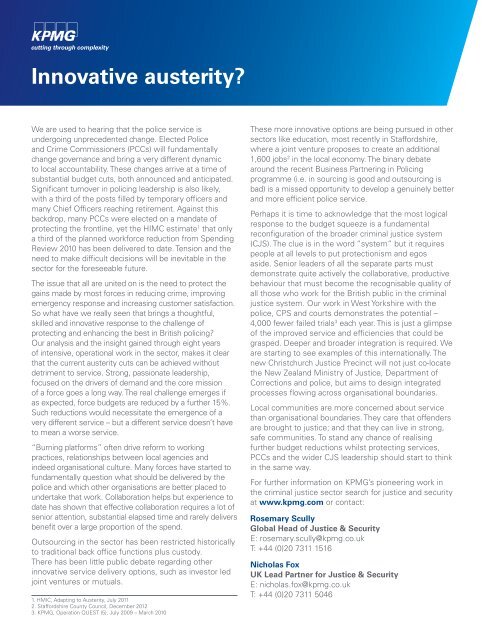Policing UK 2013 - Police Federation
Policing UK 2013 - Police Federation
Policing UK 2013 - Police Federation
You also want an ePaper? Increase the reach of your titles
YUMPU automatically turns print PDFs into web optimized ePapers that Google loves.
Innovative austerity?<br />
We are used to hearing that the police service is<br />
undergoing unprecedented change. Elected <strong>Police</strong><br />
and Crime Commissioners (PCCs) will fundamentally<br />
change governance and bring a very different dynamic<br />
to local accountability. These changes arrive at a time of<br />
substantial budget cuts, both announced and anticipated.<br />
Significant turnover in policing leadership is also likely,<br />
with a third of the posts filled by temporary officers and<br />
many Chief Officers reaching retirement. Against this<br />
backdrop, many PCCs were elected on a mandate of<br />
protecting the frontline, yet the HIMC estimate 1 that only<br />
a third of the planned workforce reduction from Spending<br />
Review 2010 has been delivered to date. Tension and the<br />
need to make difficult decisions will be inevitable in the<br />
sector for the foreseeable future.<br />
The issue that all are united on is the need to protect the<br />
gains made by most forces in reducing crime, improving<br />
emergency response and increasing customer satisfaction.<br />
So what have we really seen that brings a thoughtful,<br />
skilled and innovative response to the challenge of<br />
protecting and enhancing the best in British policing?<br />
Our analysis and the insight gained through eight years<br />
of intensive, operational work in the sector, makes it clear<br />
that the current austerity cuts can be achieved without<br />
detriment to service. Strong, passionate leadership,<br />
focused on the drivers of demand and the core mission<br />
of a force goes a long way. The real challenge emerges if<br />
as expected, force budgets are reduced by a further 15%.<br />
Such reductions would necessitate the emergence of a<br />
very different service – but a different service doesn’t have<br />
to mean a worse service.<br />
“Burning platforms” often drive reform to working<br />
practices, relationships between local agencies and<br />
indeed organisational culture. Many forces have started to<br />
fundamentally question what should be delivered by the<br />
police and which other organisations are better placed to<br />
undertake that work. Collaboration helps but experience to<br />
date has shown that effective collaboration requires a lot of<br />
senior attention, substantial elapsed time and rarely delivers<br />
benefit over a large proportion of the spend.<br />
Outsourcing in the sector has been restricted historically<br />
to traditional back office functions plus custody.<br />
There has been little public debate regarding other<br />
innovative service delivery options, such as investor led<br />
joint ventures or mutuals.<br />
1. HMIC, Adapting to Austerity, July 2011<br />
2. Staffordshire County Council, December 2012<br />
3. KPMG, Operation QUEST (5), July 2009 – March 2010<br />
These more innovative options are being pursued in other<br />
sectors like education, most recently in Staffordshire,<br />
where a joint venture proposes to create an additional<br />
1,600 jobs 2 in the local economy. The binary debate<br />
around the recent Business Partnering in <strong>Policing</strong><br />
programme (i.e. in sourcing is good and outsourcing is<br />
bad) is a missed opportunity to develop a genuinely better<br />
and more efficient police service.<br />
Perhaps it is time to acknowledge that the most logical<br />
response to the budget squeeze is a fundamental<br />
reconfiguration of the broader criminal justice system<br />
(CJS). The clue is in the word “system” but it requires<br />
people at all levels to put protectionism and egos<br />
aside. Senior leaders of all the separate parts must<br />
demonstrate quite actively the collaborative, productive<br />
behaviour that must become the recognisable quality of<br />
all those who work for the British public in the criminal<br />
justice system. Our work in West Yorkshire with the<br />
police, CPS and courts demonstrates the potential –<br />
4,000 fewer failed trials 3 each year. This is just a glimpse<br />
of the improved service and efficiencies that could be<br />
grasped. Deeper and broader integration is required. We<br />
are starting to see examples of this internationally. The<br />
new Christchurch Justice Precinct will not just co-locate<br />
the New Zealand Ministry of Justice, Department of<br />
Corrections and police, but aims to design integrated<br />
processes flowing across organisational boundaries.<br />
Local communities are more concerned about service<br />
than organisational boundaries. They care that offenders<br />
are brought to justice; and that they can live in strong,<br />
safe communities. To stand any chance of realising<br />
further budget reductions whilst protecting services,<br />
PCCs and the wider CJS leadership should start to think<br />
in the same way.<br />
For further information on KPMG’s pioneering work in<br />
the criminal justice sector search for justice and security<br />
at www.kpmg.com or contact:<br />
Rosemary Scully<br />
Global Head of Justice & Security<br />
E: rosemary.scully@kpmg.co.uk<br />
T: +44 (0)20 7311 1516<br />
Nicholas Fox<br />
<strong>UK</strong> Lead Partner for Justice & Security<br />
E: nicholas.fox@kpmg.co.uk<br />
T: +44 (0)20 7311 5046
















